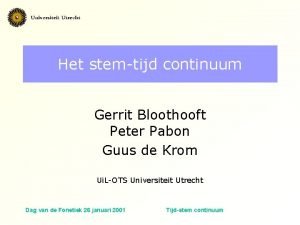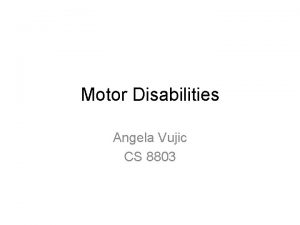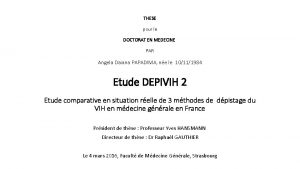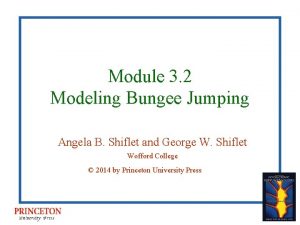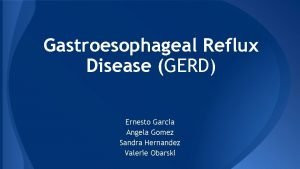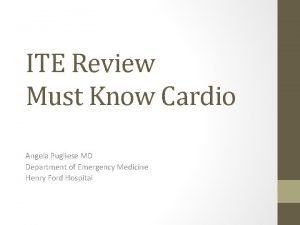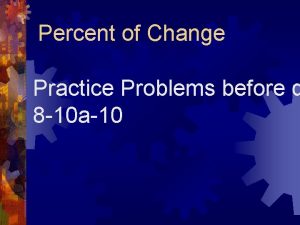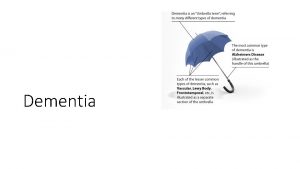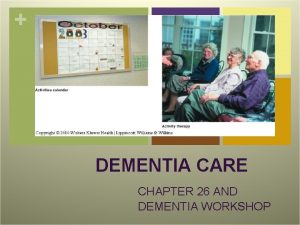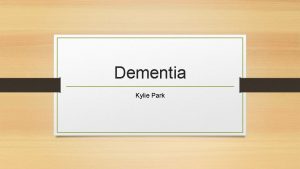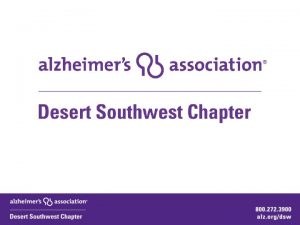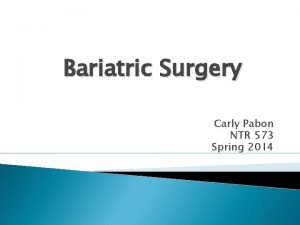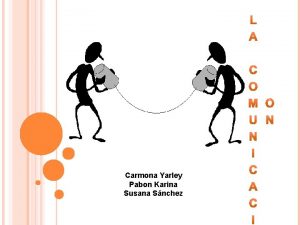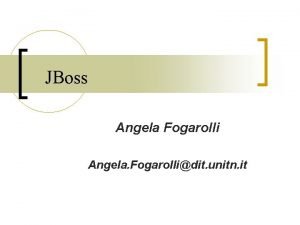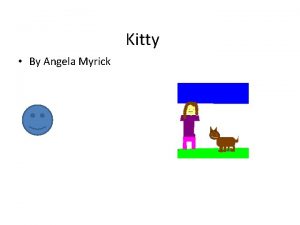DEMENTIA By Angela Pabon What is Dementia Dementia

DEMENTIA By: Angela Pabon

What is Dementia? • Dementia does not always mean that one has Alzheimer's disease, there are over 80 forms of dementia • The definition of dementia is the gradual reduction of cognitive skills, memory, language usage and problem solving ability • Caused by physical changes in the brain

Types of Dementia • Most types of dementia are nonreversible (degenerative) *meaning changes in the brain cannot be stopped • However, some causes of dementia may be stopped or reversed if they are found soon enough, including: • Brain injury • Brain tumors • Chronic alcohol abuse • Changes in blood sugar, sodium, and calcium levels • Low vitamin B 12 levels • Normal pressure hydrocephalus

. . Types of Dementia • Alzheimer’s Disease • Vascular Dementia • Dementia with Lewy Bodies (DLB) • Mixed Dementia • Parkinson’s Disease • Frontotemporal Dementia • Creutzfeldt-Jakob Disease • Normal Pressure Hydrocephalus • Huntington’s Disease • Wernicke-Korsakoff Syndrome

Alzheimer’s Disease • Most common type of dementia (60%-80%of cases) • Symptoms: • Difficulty remembering names and recent events, apathy and depression (early symptoms) • Impaired judgment, disorientation, confusion, behavior changes and difficulty speaking, swallowing and walking (later symptoms)

. . Alzheimer’s Disease • Brain changes: • Hallmark abnormalities are deposits of the protein fragment beta-amyloid (plaques) • Twisted strands of the protein • Evidence of nerve cell damage and death in the brain

Vascular Dementia • Previously known as post-stroke dementia *second most common cause of dementia • Symptoms: • Impaired judgment or ability to plan steps needed to complete a task *more likely to be the initial symptom* • brain injuries such as microscopic bleeding and blood vessel blockage • Location of the brain injury determines how the individual's thinking and physical functioning are affected • Brain changes: • blood vessel problems (Inadequate blood flow)

Lewy Bodies (DLB) • Symptoms: • memory loss and thinking problems common in Alzheimer's • sleep disturbances, well-formed visual hallucinations, and muscle rigidity or other parkinsonian movement features • Brain changes: • Lewy bodies: abnormal aggregations (clumps) of the protein alpha-synuclein *developed in the cortex

Mixed Dementia • In mixed dementia abnormalities linked to more than one type of dementia occur simultaneously in the brain • Brain changes: • Characterized by the hallmark abnormalities of more than one type of dementia (most commonly, Alzheimer's and vascular dementia)

Parkinson’s Disease • Often results in a progressive dementia • Symptoms: • Problems with movement • When dementia develops symptoms are often similar to dementia with Lewy bodies

. . Parkinson’s Disease • Brain changes: • Alpha-synuclein clumps are likely to begin in an area deep in the brain called the substantia nigra • Substantia nigra: located in the mid-brain, controls voluntary movement, regulates mood, produces dopamine • clumps cause degeneration of the nerve cells that produce dopamine • Dopamine: neurotransmitter that helps regulate movement and emotional responses

Frontotemporal Dementia • Includes dementias such as behavioral variant FTD (bv. FTD), primary progressive aphasia, Pick's disease and progressive supranuclear palsy • Symptoms: • changes in personality and behavior and difficulty with language * Nerve cells in the front and side regions of the brain are especially affected

Creutzfeldt-Jakob Disease • Most common human form of a group of rare, fatal brain disorders affecting people • Symptoms: • Rapidly fatal disorder that impairs memory and coordination and causes behavior changes • Brain changes: • Results from misfolded prion protein in the brain that causes a "domino effect“ and malfunctions

Normal Pressure Hydrocephalus • Symptoms: • difficulty walking, memory loss and inability to control urination • Brain changes: • Caused by the buildup of fluid in the brain *Can sometimes be corrected with surgical installation of a shunt in the brain to drain excess fluid*

Huntington’s Disease • A progressive brain disorder caused by a single defective gene on chromosome 4 • Symptoms: • abnormal involuntary movements • severe decline in thinking and reasoning skills • irritability, depression and other mood changes • Brain changes: • The gene defect causes abnormalities in a brain protein that, over time, lead to worsening symptoms

Wernicke-Korsakoff Syndrome • Chronic memory disorder caused by severe deficiency of thiamine (vitamin B-1) *most commonly caused by alcohol misuse • Symptoms: • Memory problems may be strikingly severe while other thinking and social skills seem relatively unaffected • Brain changes: • Effects Thiamine *Thiamine: helps brain cells produce energy from sugar. (When thiamine levels fall too low, brain cells cannot generate enough energy to function properly)

Dementia vs. Normal Aging • Dementia is not normal aging and is characterized by multiple cognitive deficits with memory impairments • Executive functioning • Language • Working (immediate) memory • Spatial memory • Verbal memory

Dementia vs. Normal Aging Generally, there must be an impairment in social functioning and independent living for a diagnosis of dementia to be given. *Independent living : describes the ability to shop alone, manage finances, perform basic household duties and monitor appropriate social behaviors.

Treatment • Treatment depends on the condition causing the dementia. • A person's eyes and ears should be checked regularly. Hearing aids, glasses, or cataract surgery may be needed.

Prevention • Most causes of dementia are not preventable. • Quitting smoking and controlling high blood pressure and diabetes can help you reduce your risk of vascular dementia. (This is dementia caused by a series of small strokes) • Eating a low-fat diet and exercising regularly may also reduce the risk of vascular dementia.

Works Cited
- Slides: 21

